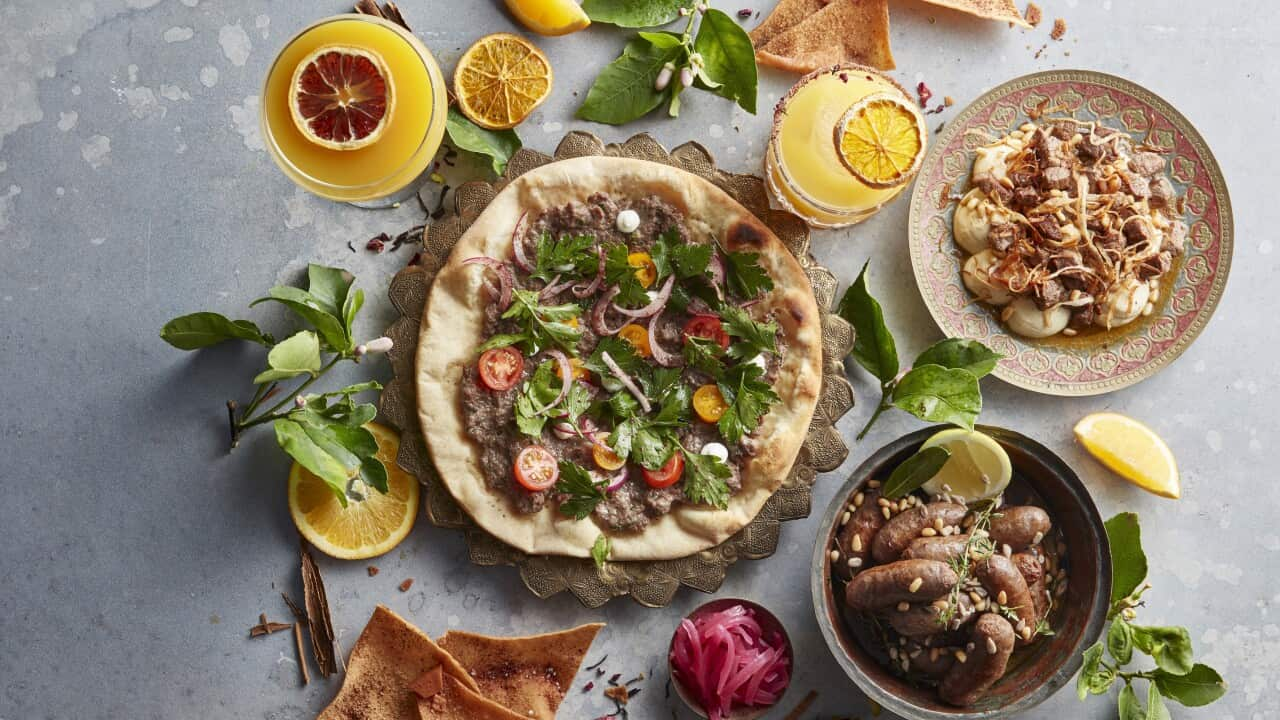Just thinking of a Lebanese Christmas inspires a mix of emotions, memories and the mouth-watering promise of traditional and modern food, which provide leftovers that last well into the New Year.
My father's parents come from a tiny mountainside village in the north of Lebanon, Kfarsghab. Its population is small and mostly related. Many locals immigrated to Australia.
My grandparents, Arthur and Sandra Haddad, arrived in Australia as children with their parents and have since spent most of their adult life here, raising a family and establishing themselves in the Australian community. Growing up in Sydney, I mostly learned about my Lebanese heritage through food and family traditions. I never learned Arabic with any fluency; I mostly spoke in broken Lebanese.
Growing up in Sydney, I mostly learned about my Lebanese heritage through food and family traditions. I never learned Arabic with any fluency; I mostly spoke in broken Lebanese.

My grandparents, Arthur and Sandra Haddad, when they were young. Source: Clare Haddad
As a child, I have distinct memories of Christmas. Every year, the grandchildren, including myself, would help put up the Christmas tree and decorate the house with the most elaborate ornaments. An abundance of groceries took their spots in the kitchen and the 'good room' (we were never allowed in the good room except for Christmas). The anticipation of a family feast built steadily over those weeks.
One aspect of this feast that never fails to impress was the turkey – or turkeys, given the size of our family. No matter how hot Christmas got, there was always hot turkey and gravy, which we all looked forward to. It was served alongside the usual Australian Christmas fare of seafood and salad, which consisted of and fattoush.
CHRISTMAS SALAD

Fattoush
We'd roast the turkey slowly throughout the morning. It was filled with traditional Lebanese stuffing – rice, pine nuts, minced meat and spices – adding a particular flair to a traditional Christmas meal. The turkey was served on the 'good platters', accompanied by large boats of mushroom gravy. It was food for the soul, alright.
I can't imagine eating turkey any other way. And I absolutely can't imagine eating stuffing if it's not Lebanese. Whether this is because I'm so used to it or I'm preserving my heritage, there is only one way of preparing and eating it.
I can't imagine eating turkey any other way. And I absolutely can't imagine eating stuffing if it's not Lebanese.
This Christmas will be different for our family. During Sydney's Delta-outbreak lockdown in July, my grandmother passed away. She joined my grandfather, who we lost in 2017. Anticipating our first Christmas without our steady matriarch is daunting, as is any 'first' that you experience after losing a beloved family member. I've found myself lost in memories more and more as Christmas approaches. I recall long lunches and late dinners with my grandparents at the head of the table, always seated side by side. The entire family gathered to eat, talk, laugh and debate. I keep remembering my grandmother's go-to Christmas drink, a shandy, and my grandfather sipping brandy after dessert, despite his diabetic diet. I also remember my grandmother arranging a birthday cake for Jesus. Us kids would sing along as directed, trying to keep straight faces.
I keep remembering my grandmother's go-to Christmas drink, a shandy, and my grandfather sipping brandy after dessert, despite his diabetic diet. I also remember my grandmother arranging a birthday cake for Jesus. Us kids would sing along as directed, trying to keep straight faces.

At Christmas, Clare Haddad's family likes to mix traditions through food, such as this pavlova. Source: Clare Haddad
To me, the preservation of these traditions and my heritage has become even more important now, even if doing so is for the sake of my grandparents. Their pride in their origins drives my desire to keep our connection to our tiny village alive, and to weave Lebanese traditions into an Australian Christmas demonstrates exactly what this country is all about.
LOVING LEBANESE FOOD

9 tasty ways to use up leftover Lebanese bread and pita






